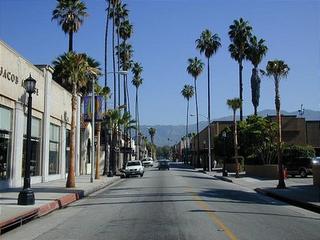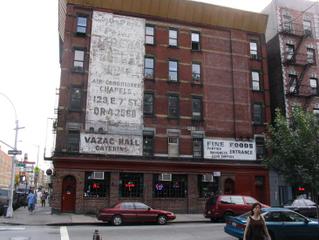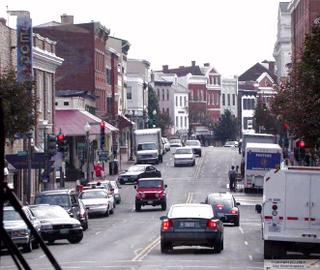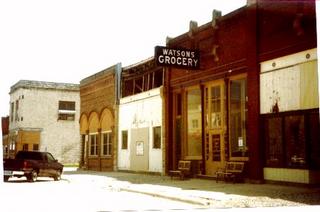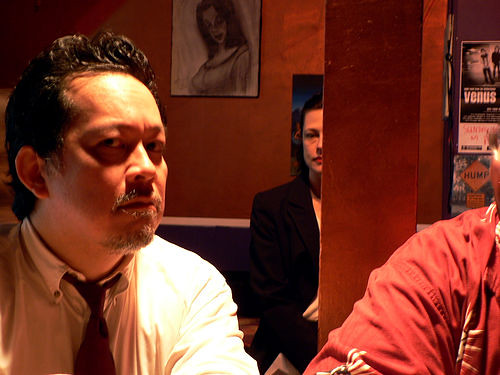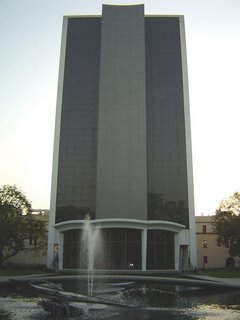 Sometime in the 70's disco came on the scene. The songs were long and repetitious with lyrics which, more often than not, were either sappy or stupid or both. To say that you liked disco was to say you weren't cool. And if on hearing the phrase "Disco sucks," you didn't at least nod your head slightly or come back with a hearty "Right On" (an expression that was on its last legs when disco came around), then people would give you a funny look. It was the sort of look a communist sympathizer would get in the 50's during the McCarthy era.
Sometime in the 70's disco came on the scene. The songs were long and repetitious with lyrics which, more often than not, were either sappy or stupid or both. To say that you liked disco was to say you weren't cool. And if on hearing the phrase "Disco sucks," you didn't at least nod your head slightly or come back with a hearty "Right On" (an expression that was on its last legs when disco came around), then people would give you a funny look. It was the sort of look a communist sympathizer would get in the 50's during the McCarthy era.Now, of course, disco is considered rather cool, if only for nostalgic reasons or as an example of 70's kitsch. Now it's all right to admit, even in the hippest circles, that you like disco. Now it's even all right to admit that as a teenager growing up in the 70's, you had a good time. I know now that I had a good time back then. It's just that in the 70's I didn't know what a good time was.
I was attending the local Jesuit high school then—Gonzaga College High School as it was properly called. I'd gotten there at a time when the Jesuits—who were known for the rigors of their educational system—had loosened up a bit. Thus, while the whole concept of the "me decade" was gathering steam, the Jesuits rebelled by belatedly getting into the hip spirit of the 60's.
Admittedly, some of their attempts at being hip were somewhat embarrassing, as when one teacher presented to our class the liner notes to Grand Funk Railroad's Closer To Home. "They are three who belong to the New Culture setting forth on its final voyage through a dying world..." he quoted, "searching to find a way to bring us all CLOSER TO HOME." It was an attempt by the Jesuits to use contemporary culture as a way of getting us interested in the classics: "Now compare the concept of Grand Funk's voyage to Odysseus's own journey home..." he said, "I think you'll be surprised by the similarities."
Those of us in my small circle of hip friends all looked at each other and snickered, "Oh cool, heh heh heh..." Still, we appreciated that he didn't try to find classical references in some disco song, because that would have been completely uncool. We stayed away from disco, preferring to find our classical references in things like The Mothers Of Invention's We're Only In It For The Money, Captain Beefheart's Trout Mask Replica, and The Velvet Underground's White Light/White Heat.
We played these records and got drunk and nasty with our drunk and nasty girlfriends—the kind of girls who, on meeting your parents, would offer them a beer or a cigarette as a way of breaking the ice. We were what people called "shirkers" or "slackers," which was a nice way of saying that we were fuck-ups.
But we were smart fuck-ups, with an odd assortment of quirks and obsessions, none of which had anything to do with high school or matters kids of that age are supposed to be concerned with—because we had our own concerns. We drank to excess and wandered around Georgetown, got stoned and caught double features at the old Circle Theater, dropped acid and hung out in the sculpture garden at the Hirshhorn: we needed that "edge" to enjoy ourselves. And in school when we were assigned books like A Separate Peace or Lord Of The Flies—books that were supposed to pique the interest of our young minds—we summarily ignored our assigned reading and turned to books like Fear And Loathing In Las Vegas, Naked Lunch, and On The Road.
But while my friends were getting bad grades or were on the verge of flunking out, I was doing well, especially in math and science. I had a knack for these things—it didn't take any real effort on my part. And in the summer between my junior and senior year, I went to the University of Georgia to study chemistry on a National Science Foundation grant. They set me up in a lab in the pharmacy school, no less, leaving me to work on my own. So when I was done each day with my assigned experiments I got to work learning how to make my own LSD. By the end of the summer I had it, in the form of an entire gallon of what we called "sugar water."
Back in Washington my friends and I began taking a lot of it—it was good stuff. But sometimes I was the only one taking any, and it was on one of these occasions, while turning the dial on my girlfriend's car radio from station to station, that I first heard the song. It began with a chunky bass line, a snapping of the high hat, and a vampish piano. And then the words—bold words, daring words—words which, while I was high on acid, seemed to speak to my soul. And the words were:
Fly robin fly
Fly robin fly
Fly robin fly
UP UP TO THE SKY!
And with the line "Up up to the sky" I took off. I was up there, in the sky. I was a fucking bird, a robin, flying over Washington, over the monuments, over the Potomac river, going who knows where. Eventually I reached another city—I hoped it would be Paris or London—but it turned out to be Baltimore. Still, this was the best trip I'd ever had.
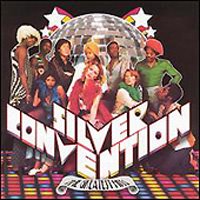
A week later I heard the song again over the sound system at the Post Cafeteria across the street from Gonzaga. Though I was completely straight this time I still liked it, loved it even. I thought that this song by The Silver Convention, "Fly Robin Fly," was the coolest thing I'd ever heard. And not only was it cool, it was also, to use a word which I'd never before ascribed to anything in my life, beautiful.
I immediately went out and bought the record—the twelve inch Disco Night In Purgatory mix. This version went on forever, building up slowly with the girls singing "fly robin fly" about a hundred times before finally taking off with that orgasmic "Up up to the sky!"
My friends thought I'd lost my mind—a teenage acid casualty. My girlfriend thought I was joking at first, but when she realized I was serious about liking this song she was not amused. If I actually liked that song what was next, she wondered. Going to football games? Church? The Senior prom?
Well, it wasn't long before I stopped seeing her and my other friends. I suppose that in the back of my mind I felt my old crowd was holding me back; and though it would bean exaggeration to say that "Fly Robin Fly" was what moved me away from them, this song was, at the very least, a catalyst for this departure.
Soon I was hanging out with the straight crowd, the kids the teachers liked, the kids who were supposed to be going places. I ended up doing all the typical high school activities. I joined the science club, the math club, the military strategy club; I got a part in the school play; I even went to the senior prom where the band played my song, the song that had inadvertently given me what my teenage spirit was looking for—namely, a sense of direction.
My old crowd I now considered unsafe or, at best, a dead end. But there were things about the good kids that bothered me too, and what bothered me most was that they didn't seem to have a proper sense of doubt about themselves, which was perhaps the very reason they were going places. Me, I had a different approach to moving ahead. I wanted to move ahead with my sense of doubt intact. It seemed, at that time when a strange sense of idealism was creeping upon me, to be a more honest approach.
Towards the end of senior year my new friends and I had all been accepted at some of the best schools—Harvard, Yale, MIT. I was accepted at Cal Tech, which gave me a full tuition scholarship, room and board, even travel expenses. It wouldn't cost me a dime to go there, to sunny Pasadena, California with its palm trees and leggy blonde California girls. But now that I saw myself on a path to success and well-being, I realized that these were two things I was ill equipped to handle. After all, how on earth could a freaked out loser like me turn himself around and become some sort of a big wheel or one of the mover and shaker types? It could happen, I knew, but I also believed it would be unnatural and that success, for me, would be nothing more than a surface affectation, an act, a scam. Because although there were many things I'd believed in since I was a child—things like ghosts, UFOs, mental telepathy, and the lost continent of Atlantis—one thing I'd never believed in was the so-called American Dream.
Hence, I turned down the scholarship. I went to college in town—to Catholic University—a school where I'd have to pay my own way through. I turned away from science and math and studied English literature instead, which was something I was interested in but had no great talent for. In doing this I thought I was guaranteeing that I'd never become a success.
There's not much to say about my college years. Although it was a time spent mostly with the straight crowd, I still managed to avoid things like fraternities, school sporting events, and homecoming. I also tended to avoid the campus Rathskeller, preferring to do my drinking at Fred's, one of the bars in the local Brookland neighborhood near Catholic. When I did, through some odd circumstance, find myself at the Rathskeller my friends would put songs like "We Are Family" or "Disco Inferno" on the jukebox, songs I actually liked. But I kept to myself that I also liked bands such as The Sex Pistols, The Ramones, and Joy Division. Instead, I'd bring up the subject of "Fly Robin Fly." "It's kind of stupid," I'd say, "but also kind of catchy." "Yeah," they'd answer with a shrug, "it's okay." And then I'd go off to Fred's to drink by myself.
A couple of weeks after graduating from college I got a job driving a car out to some people in San Mateo, California, just south of San Francisco. It was a silver Mercedes Benz with power windows, cruise control, sun roof—the works. After dropping it off and getting paid, I went up to San Francisco and stayed with a girl I'd known from my high school days—someone from my old crowd. She'd moved out there a year earlier and was now, to my surprise, preparing to go to law school. She was the only person from my old crowd that I'd stayed in touch with. That I'd stayed in touch with her had to do, I suppose, with the fact that I'd always secretly had a thing for her. And I also suppose that the reason I took the job driving the car out west was not so much to escape Washington but to see her.
So there I was, in San Francisco, three thousand miles away from Washington, and things were going well. She and I got close very quickly. I was with her for a month, at the end of which I left town. And though I could say that I left because the sense of well-being that had come over me out there was beginning to frighten me somehow—that I still didn't think I could handle success in any form—the real reason for my leaving was that she'd decided, after a day of heavy reflection, that I really wasn't the sort of person she should be with. After all, she was going to law school in the fall, and I was someone who just liked to go out and get drunk, someone without any real plans for the future, someone without a dream.
I took the bus to Los Angeles and checked into a cheap hotel. I'd been there for two days when one afternoon I went to Pasadena and saw the Cal Tech campus. The next day I was on the bus again, making my way slowly back to Washington.
It was a long, depressing ride and somewhere in Texas—I think in the town of Fort Stockton—we had a one hour dinner stop. There was a diner in the bus station there, but I went next door to the local convenience store and got one of those small apple pies and a can of beer. I stood outside, ate the pie, then started on the beer. I was beginning to feel nauseous when a young guy who'd been on the bus came out of the diner carrying his boom box with him. He nonchalantly brushed back his hair, pressed a button on the boom box, then set it down on the ground. To my amazement it began to blast "Fly Robin Fly." As the guy listened to the song he started practicing his disco dance moves, shifting his feet and making these swirling motions with his index fingers.
It was a hideous sight and that song, which I had enjoyed so much in the past, now seemed equally hideous. Because just as Circe had turned Odysseus's men into beasts, "Fly Robin Fly" had transformed me into a creature of ambition at a time when I wasn't at all prepared for it, leaving me here, standing by the roadside in some two-story Texas town ready for a pointless confrontation with an itinerant disco punk.
"Turn that shit down!" I yelled at him.
He looked over to me and sneered. "Who are you to tell me what to do?"
"Just turn the fucking thing down," I yelled again, sneering back at him.
I'd been on the bus some twenty-four hours, while he'd only gotten on at the last stop. I was unwashed and unshaven. I was angry and disgusted. It must have made me look pretty tough. He turned the music down.
I finished my beer, then got on the bus and sat back, waiting for the ride to continue.
Originally written, at the behest of Gillian McCain, for the St. Mark's Poetry Project's reading Epiphany Albums: The Record That Changed My Life, in 1992.
